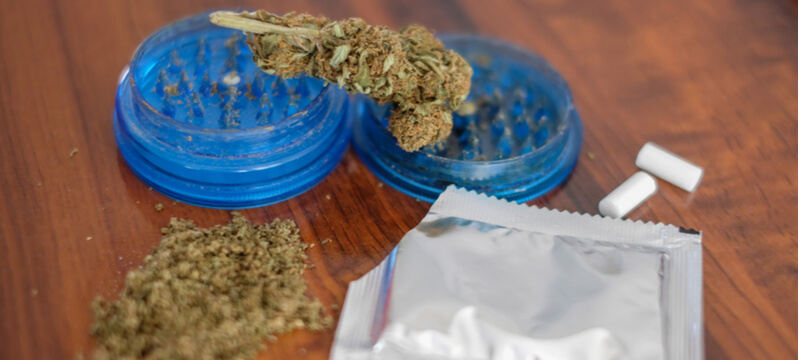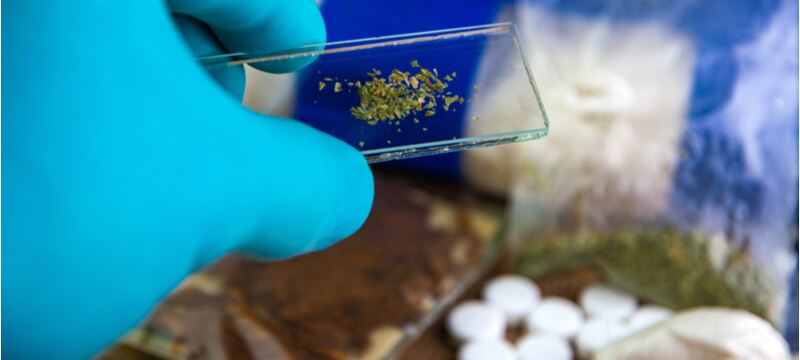
For thousands of years, humans have been using cannabis to treat a myriad of health conditions, from arthritis to depression. In fact, some of the earliest evidence of cannabis use can be traced back 2500 years. In modern times, thanks to ongoing scientific research, we understand cannabis much better, and now know that it is the cannabinoids in the plant that make it special. And although research is still ongoing and no factual claims can be made about the effects of cannabinoids such as CBD and THC, many people from diverse backgrounds swear by it. However, with the popularity of cannabinoids growing, some have seen it as an opportunity to make money by creating synthetic cannabinoids. But what are synthetic cannabinoids, and should you be avoiding them?
Table of Contents
What are synthetic cannabinoids?
Synthetic cannabinoids are chemicals designed to mimic the effects of cannabis, particularly that of tetrahydrocannabinol (THC), the psychoactive compound in cannabis. However, “synthetic cannabinoids” aren't a synthetic form of cannabis, and don't actually have the same effects as THC. Unlike cannabis, they produce a slew of adverse effects. The correct term for them are synthetic cannabinoid receptor agonists (SCRAs), but the misleading “synthetic cannabinoids” is the common term people use to describe these chemicals.
Often advertised as herbal incense, herbal smoking mixtures or aphrodisiac tea, synthetic cannabinoids have been sold online as early as 2004.
Dealers market them under many different names, such as:
- Spice
- K2
- Skunk
- Kronic
- Northern Lights
- Bombay Blue
- Kaos
- Black Mamba
Not all synthetic cannabinoids are equal. Pure powder form is much safer than pre-mixed blends such as Spice, which can easily lead to an overdose due to the fact that the products do not list individual chemicals and dosages.
How to take synthetic cannabinoids
Usually available in powder form, these chemicals are mixed with solvent and sprayed onto dry herbs to look like marijuana. Users typically smoke or vaporise these herbs to induce a rapid onset of effects, which can be felt within minutes. They can also be dissolved in a lipid, making them orally active, which can considerably extend the duration.
There is no safe way to use synthetic cannabinoids.
Side effects of synthetic cannabinoids
Using synthetic cannabinoids can lead to serious side effects as they are potentially toxic. Many people have been hospitalised believing that these man-made chemicals have the same strength, danger potential, and effects as cannabis. This is obviously not the case.
Synthetic cannabinoids affect individuals differently. How it affects someone is based on a number of factors, such as:
- Age, weight and health of user
- Other substances and medications user is on
- Strength of synthetic cannabinoid (varies in each batch)
- Amount taken
While most users of synthetic cannabinoids use the chemical to relax or get high, the side effects far outweigh the so-called benefits.
The potential side effects of synthetic cannabinoids can include the following:
- Aggression
- Agitation
- Anxiety
- Breathing difficulties
- Breakdown of muscle tissue
- Chest pain
- Hypertension
- Hyperthermia
- Increased heart rate
- Paranoia
- Psychosis
- Seizures
- Stroke
- Trouble coordinating
- Vomiting
Worst of all, it can even lead to death.
Risks associated with synthetic cannabinoids
Unlike natural cannabinoids, synthetic cannabinoids have been linked to multiple deaths, usually due to serious side effects from long term use and repeated abuse of the chemical. We strongly advise against using synthetic cannabinoids for long periods or in high doses.
Compared to cannabinoids such as THC, the adverse effects of synthetic cannabinoids are often much worse. Many believe that some organic compounds in synthetic cannabinoids, such as naphthalene, can be toxic or carcinogenic (cause cancer).
Prolonged use of synthetic cannabinoids can increase the risk of mental disease and psychosis, especially in people predisposed to psychotic illnesses, such as a family history of mental illness. However, even healthy people can develop psychosis.
The extreme psychotic state induced by synthetic cannabinoids can last for several weeks, sometimes even months. Many believe synthetic cannabinoids are more likely to cause psychosis than natural cannabis because it lacks the antipsychotic compound cannabidiol (CBD).
One of the most important things to keep in mind is that taking synthetic cannabinoids can become life-threatening when taken with certain other substances, even legal ones.
For example, mixing synthetic cannabis with antidepressants can lead to:
- Fever
- Increased heart rate
- Seizures
- Organ failure
- Coma
- Death
Are synthetic cannabinoids addictive?
Synthetic cannabinoids are somewhat addictive, especially when compared to natural cannabinoids. They have a high potential for abuse, and can cause psychological dependence. In fact, once addicted, a user will experience cravings, and withdrawal symptoms may occur if they abruptly stop using. These symptoms include:
- Anxiety
- Insomnia
- Increased heart rate
- Loss of appetite
- Mood swings
- Nausea
- Panic attacks
- Paranoia
So yes, synthetic cannabinoids are addictive. Some people even develop a tolerance to it, which means they need more to feel the same effects. This makes it much more dangerous, and the chance of having a severe reaction dramatically increases.
Are synthetic cannabinoids legal in the UK?
The law surrounding synthetic cannabinoids in the UK is complicated. Most of these chemicals are classed as Class B substances, which means they are illegal to produce or supply without a licence and cannot be possessed without a prescription.
To work around this, producers alter the chemical structure of the drugs so that the newer products available on the market no longer fall under this category and can be classified as “new psychoactive substances” colloquially known as “legal highs”. The new substances will be subject to regulations under the Psychoactive Substances Act of 2016, allowing possession to be legal for personal use. However, importation, exportation, production, supply and possession with the intent to supply are still offences.
Key takeaways
Synthetic cannabinoids have no medical benefit. The main reason people choose to use it is to relax and feel euphoric. However, the potentially harmful effects users can experience from this chemical cancel out any benefits. If you’re looking for a natural means of maintaining your health, you won't find it in synthetic cannabinoids. Natural cannabinoids, such as CBD, are what you’re looking for.
Studies on CBD and its benefits are still in their infancy. However, available evidence, both scientific and anecdotal, suggest CBD may have the potential to help with several ailments and also with maintaining a healthy lifestyle. There have been no deaths or severe side effects linked to CBD usage, even when used in excess, and the benefits users claim to experience are phenomenal.
So, instead of using synthetic cannabinoids, reach for natural cannabinoids, such as CBD oil. Just remember to discuss it with your doctor first to see if it is the right choice. While CBD isn’t toxic, it can interact with other medications you may be on.
Find out more about the potential benefits and effects of CBD on our post “CBD oils benefits list UK: fact or fiction? What are the side effects?”






